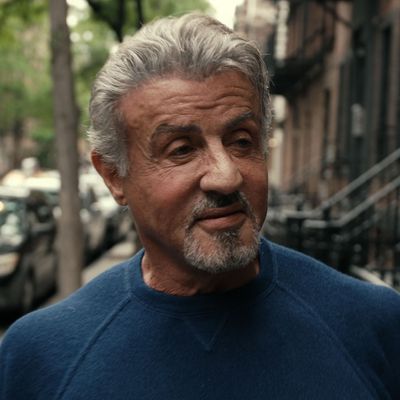
I was never much of a Sylvester Stallone fan as a kid. I was certainly the right age when his Rocky and Rambo sequels were coming out in the 1980s, but that brand of aggressive, muscle-bound machismo, which found favor in an America eager to refight the battles of the ÔÇÖ60s and ÔÇÖ70s, I found off-putting; Sly and some of his ÔÇÖroided-up imitators seemed like flesh-and-blood manifestations of reactionary, Reaganite rage.
But I learned to appreciate the man as I got older. I enjoyed that period when he caught a second wind in the ÔÇÖ90s, with films like Cliffhanger and Demolition Man, and I adored his performance in Copland. I was even there opening night for Judge Dredd (which, sadly, stank). When I saw Stallone speak at Cannes a few years ago, I found him to be forthright, humble, and funny.
It is that same Stallone we see in Sly, the new documentary thatÔÇÖs more a selective apologia than a thorough accounting. Stallone relates some familiar anecdotes from his career ÔÇö like that time when a Dolph Lundgren punch nearly killed him, or how he came up with the idea for The Expendables while watching a terrible nostalgia-rock reunion concert ÔÇö but at the heart of the movie are the feelings of inadequacy he was cursed with by an abusive father. We hear about the young SlyÔÇÖs love of horses and polo, which were scuttled when his dad ran onto the field and tore him off his horse during a game. Later, as adults, they played polo together; this time, his father seriously injured him during the match. We learn that, after the success of Rocky, his father tried to get his own boxing movie off the ground, called Sonny! That bit I had to rewind twice, to make sure I heard it right.
The 77-year-old StalloneÔÇÖs face nowadays is as sculpted as his body was back in the day; the perpetually arched eyebrows donÔÇÖt move much, so we donÔÇÖt see a ton of emotion on his face as he opens up about all this heartbreak. Intentional or not, it works. He looks more bemused than sad, or outraged, which, in the moment, makes him an ideal storyteller. The filmÔÇÖs loose framing device has Stallone moving house from California back to the East Coast, and director Thom Zimny probably spends too much time lingering over shots of statues and figurines of Stallone over the ages being wrapped and packaged for the move. But, well, why be subtle or restrained in a movie about Sylvester Stallone?
Zimny, a veteran music-video and concert-doc director, treats Stallone like a bit of a rock star. He lets us watch the actor move as he talks, walking down the street or gesturing with those enormous arms of his. There are talking heads here ÔÇö New York Times critic Wesley Morris, Arnold Schwarzenegger, and Quentin Tarantino among them ÔÇö but their insights are limited to a few impressions. By and large, Stallone narrates his own story, which means he controls it. (He also executive-produced the film.) We donÔÇÖt hear much about his tumultuous private life or his controversies. The bombs discussed are a select few. So Sly isnÔÇÖt a critical movie. But itÔÇÖs also not a hagiography, either. It adopts StalloneÔÇÖs own partly bemused attitude toward his own career.
StalloneÔÇÖs limitations as an actor were the keys to his success. ThatÔÇÖs true of all movie stars, but itÔÇÖs maybe truer of him than anyone else. It was the actorÔÇÖs inability to find good roles that led to his writing Rocky for himself to star in, as a bruiser ÔÇ£with a gentle touch,ÔÇØ as he puts it. But once his career took off, Stallone distanced himself from that idea, as the Rocky movies became cartoonish, macho spectacles. A similar reverse alchemy happened with the character of John Rambo, who went from the violent, doomed psychopath of David MorrellÔÇÖs novel First Blood to a noble, lone-wolf warrior in StalloneÔÇÖs Rambo sequels, a one-man do-over of the Vietnam War and its attendant catastrophes.
Stallone understandably has a higher estimation of the emotional resonance of some of those films than I do. His acting may have been stiff, but the sincerity was there. He channeled his feelings about his father into his big acting moments in these movies. And a desire to be a better father than the one he had led to his casting his son Sage as RockyÔÇÖs son in Rocky V. (A different actor played the character in 2006ÔÇÖs Rocky Balboa. Sage tragically died in 2012.)
Stallone feels strongly about these later Rocky films, regardless of what others may think of them. But in this, he appears to have found peace. These movies, he seems to suggest, were more expressions of frustration and impotence than anything else. That the emotions werenÔÇÖt always convincing to some of us doesnÔÇÖt really matter; what matters is that he lived them and felt them. As a movie, Sly is something of a mess. But as a portrait of a messy man, it can be quite moving.
More Movie Reviews
- Julianne Moore and Tilda Swinton Are Perfectly Imperfect Together
- Tyler PerryÔÇÖs Cosplay of a War Movie Hardly Does Its Subjects Justice
- Jim Carrey (and Jim Carrey) Elevate Sonic the Hedgehog 3


